-

新人教版高中英语必修3Unit 3 Diverse Cultures-Reading and Thinking教学设计
Discuss these questions in groups.Q1: Have you ever been to a place that has a diverse culture ? What do you think about the culture diversity ?One culturally diverse place that I have been to is Harbin, the capital city of Heilongjiang Province. I went there last year with my family to see the Ice and Snow Festival, and I was amazed at how the culture as different to most other Chinese cities. There is a big Russian influence there, with beautiful Russian architecture and lots of interesting restaurants. I learnt that Harbin is called “the Oriental Moscow” and that many Russians settled there to help build the railway over 100 years ago.Q2: What are the benefits and challenges of cultural diversity ?The benefits: People are able to experience a wide variety of cultures, making their lives more interesting, and it can deepen the feelings for our national culture, it is also helpful for us to learn about other outstanding culture, which helps improve the ability to respect others. The challenges: People may have trouble communicating or understanding each other, and it may lead to disappearance of some civilizations and even make some people think “The western moon is rounder than his own.”Step 7 Post reading---RetellComplete the passage according to the text.Today, I arrived back in San Francisco, and it feels good (1) _____(be) back in the city again. The city succeeded in (2)_________ (rebuild) itself after the earthquake that (3)________ (occur) in 1906, and I stayed in the Mission District, enjoying some delicious noodles mixed with cultures. In the afternoon, I headed to a local museum (4)____ showed the historical changes in California. During the gold rush, many Chinese arrived, and some opened up shops and restaurants in Chinatown to earn a (5)_____ (live). Many others worked on (6)______ (farm), joined the gold rush, or went to build the railway that connected California to the east. The museum showed us (7)____ America was built by immigrants from (8)________ (difference) countries and cultures. In the evening, I went to Chinatown, and ate in a Cantonese restaurant that served food on (9)________(beauty) china plates. Tomorrow evening, I’m going to (10)__ jazz bar in the Richmond District. 答案:1. to be 2. rebuilding 3. occurred 4. that 5.living6. farms 7.how 8. different 9. beautiful 10. a

新人教版高中英语必修3Unit 4 Space Exploration-Discovering Useful Structure教学设计
The theme of the section is “Describe space facts and efforts to explore space”. Infinitives are one of non-finite verbs, as the subjects, objects, predicative, attributes and adverbials. This unit is about space exploration, which is a significant scientific activity, so every scientific activity has strong planning. Therefore, using the infinitives to show its purpose, explanations or restrictions is the best choice.1. Learn the structure, functions and features of infinitives.2. Learn to summarize some rules about infinitives to show purpose and modify.3. Learn to use infinitives in oral and writing English. 1. Learn the structure, functions and features of infinitives.2. Learn to summarize some rules about infinitives to show purpose and modify.3. Learn to use use infinitives in oral and writing English.Step 1 Lead in---Pair workLook at the following sentences and focus on the italicized infinitives. In pairs, discuss their functions. 1. I trained for a long time to fly airplanes as a fighter pilot..(作目的状语)2. As we all know, an astronaut needs to be healthy and calm in order to work in space..(作目的状语)3. First of all, you must be intelligent enough to get a related college degree..(作目的状语)4. Some scientist were determined to help humans realise their dream to explore space..(作定语)5. On 12 April 1961, Yuri Gagarin became the first person in the world to go into space..(作定语)Summary:1. 不定式的结构:to+do原形。2. 分析上面的句子,我们知道在描述太空探索时,动词不定式不仅可以用来表目的,还可以用来作定语,表修饰。

新人教版高中英语必修3Unit 4 Space Exploration-Listening&Speaking&Talking教学设计二
The themes of this part are “Talk about how to become an astronaut” and “Talk about life in space”. As Neil Armstrong said “Mystery creates wonder and wonder is the basis of man’s desire to understand. Space is difficult for human to reach, therefore, humans are full of wonders about it. However, if wanting to achieve the dream of reaching the Moon, some of our human should work hard to be an astronaut at first. Part A(Talk about how to become an astronaut) is a radio interview in a radio studio, where the host asked the Chinese astronauts about his story how to become an astronaut. Yang Liwei told his dreamed to be an astronaut since childhood. Then he worked hard to get into college at 22. The next 10 years, he gradually became an experienced pilot. At the same time, to be an astronaut, he had to study hard English, science and astronomy and trained hard to keep in good physical and mental health and to practise using space equipment. Part B (Talk about life in space) is also an interview with the astronaut Brown, who is back on the earth. The host Max asked about his space life, such as his emotion about going back the earth, the eating, shower, brushing, hobbies and his work. Part A and Part B are interviews. So expressing curiosity about the guests’ past life is a communicative skill, which students should be guided to learn.1. Students can get detailed information about how Yang Liwei became an astronaut and Max’s space life.2. Students learn to proper listening strategy to get detailed information---listening for numbers and taking notes.3. Students can learn related sentences or phrases to express their curiosity like “ I wish to know...” “I’d love to know...”4. Students can learn more about the space and astronauts, even be interested in working hard to be an astronaut

新人教版高中英语必修3Unit 4 Space Exploration-Reading and Thinking教学设计二
The theme of this unit focuses on “space exploration.” Students will learn about the training and experience needed to become an astronaut. The text is mainly about the development of space exploration. On the one hand, the text helps students to have a good understanding about the great feats humans have achieved, on the other hand, they will further understand the contributions that we Chinese have achieved, and feel confident and proud about our homeland and strengthen their love for our country. The teacher should instruct students to aim high and study harder to make great progress in the space career if possible.1. Read about the development and value of space exploration.2. Explore the mysteries of the universe and the achievements in space exploration.3. Skillfully use the vocabulary of this text to cultivate self-study ability 4. Develop cooperative learning ability through discussion.1. Enable the Ss to talk about the development and value of space exploration.2. Guide the Ss to summarize the main idea of each paragraph as well as the main idea of the text.3. Help Ss comprehend the main reasons for space exploration. Multi-media, textbook, notebooks.Step 1: Warming up and predictionLook at the title and the pictures of the text and predict what the text will be about?2. What are the main reasons for space exploration?

新人教版高中英语必修3Unit 4 Space Exploration-Reading For Writing教学设计一
另一方面,其余的人反对这个计划,因为它可能会导致一些不好的影响。7.I hold the belief that space exploration not only enable us to understand how the universe began but also help us survived well into the future.我坚信探索太空不仅能够使我们了解宇宙的起源而且能够帮助我们更好地走进未来。8.I think we should spend more time and money exploring space so as to provide new and better solutions to people's shortterm and longterm problems.为了给人类的短期和长期问题提供更新和更好的解决方法,我认为我们应该花更多的时间和金钱来探索太空。9.From my point of view,it is wrong of young people to depend on their telephones too much,which may do harm to both their physical and mental health.在我看来,年轻人过度依赖手机是不对的,因为它们可能会对他们的身心健康都有害。最近你班同学就“人类是否应该进行宇宙探索”这个问题进行了激烈的讨论。有人认为,探索宇宙不仅让人类更好地了解宇宙的发展,还可以用来指导农业生产,以及把一些探索太空的高新技术用于现实生活;也有一些人认为探索太空花掉了大量的人力物力;影响了人们的生活水平。请你根据以下情况写一篇报告并发表自己的观点。注意:1.写作内容应包括以上全部要点,可适当发挥,使上下文连贯;

新人教版高中英语必修3Unit 5 The Value of Money- Discovering Useful Structure教学设计
Step 3 Meaning1. 过去将来时表示从过去某一时间来看将要发生的动作或存在的状态, 常用在宾语从句中。一般由“would/should +动词原形”构成。She hoped that they would meet again someday. 她希望将来有一天他们能再见面。2. was/were going to+动词原形: 表示过去将要发生或很有可能发生的动作, 常用于口语中, 表示预言、意图或者打算等。He was going to start work the following week. 他打算下星期开始工作。3. was/were about to do: 常用来表示即将发生的动作, “刚要/正要做……”。注意该结构不与任何时间状语连用。I felt that something terrible was about to happen. 我感到某种可怕的事情即将发生。4.was/were to do: 表示“曾计划做某事”, 如果表示“本来计划做某事, 动作没实现”, 则需用 “was/were to have done”。She said she was to have told me about the accident. 她说她本来想告诉我关于事故的事。5.Start, go, come, leave, see, meet等动词的过去进行时: 表示就过去某一时刻而言即将发生的动作。She was coming later. 她随后就来。I had just put on my overcoat and was leaving to visit a friend of mine. 我刚穿上外套要去看我的一个朋友。

新人教版高中英语必修3Unit 5 The Value of Money-Listening &Speaking教学设计
Step 4: Listen again and decide if the following statements are true (T) or false (F).1 It was the first time Chen Liyan's story was reported. T口 F口2 Chen found 10,000 yuan in a small plastic bag in Taiyuan railway station口 F口3 Wang Zheng apologized to Chen because he couldn't offer her more money. T口 F口4 Chen took out a large loan to cure her daughter, T口 F口5 Wang set up a fundraising website for Chen's daughter after Chen told him about her situation. T口 F口Step 5:After listening, discuss the questions.1 What kind of person do you think Chen Liyan is?Chen Liyan is generous and honest because she returned a large sum of money to the owner.2 Did Chen return the money because she didn't need it?No. She returned the money because it was the right thing to do. Evidence for this is that she refused to accept the reward money because she felt that it had not been earned. 3 Is it common for people to do what Chen did?It depends on the culture. In some countries it is quite common to return money that has been found. In other countries, people believe "Finders are keepers!" 4 How did Wang Zheng feel about the return of his money?He must have been very happy and relieved to have gotten his money back. We know this because he thanked Chen repeatedly and even offered her a reward.5 Why did Ma Dongbao tell Wang about Chen's family?He must have had great sympathy for Chen and her daughter and wanted to help them.'We know this because he arranged help for them. 6 How did the news reporter feel about Chen's actions?The news reporter felt that it showed that money wasn't the most important thing in life. We know this because the reporter told us that this is what Chen believes. and then said, “that's a great attitude to take."

新人教版高中英语必修3Unit 5 The value of money-Reading and Thinking教学设计二
? Could you offer me some kind of work here?? I don’t want your charity, I just want an honest job.? Careless: I landed in Britain by accident.Step 7:Consolidation.? Find Henry? Roderick and Oliver were I .making a bet when they saw Henry, a poor young man. ? Know Henry? About a month ago, Henry was sailing and later he found himself carried out to sea by a strong wind. Fortunately, he 2.was spotted by a ship. And it was the ship that brought him to 3.England? Offer money to Henry ? Oliver and Roderick gave Henry a letter and told him that there was money in it. They 4.persuaded him to accept it, and made him 5.promise that it wouldn't be opened until 2 o'clock.Step 8:Language pointsa large amount of: a large quantity of; a great deal ofe.g. They bought a large amount of furniture before they moved their new house.make a bet: make an arrangement to risk money, etc. on an event of which the result is doubtful.e.g. We made a bet on the result of the match.permit sb to do something: allow somebody to do somethinge.g. My mother doesn’t permit me to ride in the street after it rained.by accident: as a result of chancee.g. I only found it by accident.stare at: look at somebody or something with the eyes wide open in a fixed gaze( in astonishment, wonder, fear, etc)to be honest: to tell you the truth; to be franke.g. To be honest, I don’t think we have a chance of winning.Step7 Homework:What do you think will happen to Henry? Will the bank-note help him or get him into trouble?

新人教版高中英语必修3Unit 5 The Value of Money-Reading for Writing教学设计二
2. 您能看到, 我头发太长了。You can see that my hair is much too long.3. 无论什么时候, 只要您想回来就回来。Please come back whenever you want.4. 您仅有很少的头发要理! You only have too little hair to cut !5. 为您服务是我的荣幸!It is my honour to serve you!Step 9 Writing(Henry is walking down the street when he sees a sign for a place that cuts hair. He decides to have it cut. )H=Henry B=BarberH: Good afternoon, I’d like to have my hair cut, if I may. (The barber looks at Henry’s hair and continues cutting another man’s hair. ) Er, I’d really like a haircut. As you can see it’s much too long. B: (in a rude manner) Yes, I can see that. Indeed, I can. H: Fine, well, I’ll have a seat then. (He sits in one of the barber’s chairs. The barber turns to look at Henry. )B: It’s quite expensive here, you know! Are you sure you can afford it?H: Yes. I think so. (After his hair is cut, the barber tells Henry how much he must pay. Henry shows the barber the bank note. )B: Why Mr. . . (looks shocked)H: Adams. Henry Adams. I’m sorry. I don’t have any change. B: Please don’t worry! (wearing a big smile) Nothing to worry about! Nothing at all! Please come back whenever you want, even if you only have too little hair to cut! It will be my honour to serve you!Step 10 Pair workExchange drafts with a partner. Use this checklist to help your partner revise his/her draft.1. Are all the elements of a play included and in good order ?2. Do the character use suitable language ?3. Are the stage directions clear and useful ?4. Is the plot clear and exciting enough ?

新人教版高中英语必修3Unit 5 the value of money-Reading For Writing教学设计一
【参考范文】Narrator:(Henry is smiling as he leaves the restaurant. As he is walking down the street, he sees a sign for a place that cuts hair. He decides to get it cut. )H=Henry;B=Barber;R=rude manH:Good afternoon, I'd like to get a cut, if I may. (The barber looks at Henry's hair and continues cutting another man's hair. )Er, I'd really like a haircut. As you can see it's much too long. B:(in a rude manner) Yes, I can see that. Indeed, I can. H:Fine, well I'll have a seat then. (He sits in one of the barber's chairs. The barber turns to look at Henry. )B:It's quite expensive here, you know!Are you sure you can afford it?H:Yes. I think so. (In comes the rude man. )R:Hey you there. I need a haircut quickly. Can you do me straightaway?B:All right, then, get in the chair and I'll see what I can do. R:Thank you. (sits down in one of the barber's chairs)H:Excuse me, but I was here first. Aren't you going to do my hair first?B:This man's in a hurry. H:Well so am I!I insist that you cut my hair first. B:OK, but I'll have to be quick. This gentleman is waiting. H:Thank you. (They both become quiet. After his hair is cut, the barber tells Henry how much he must pay. Henry shows the barber the bank note. )B:Why, Mr . . . (looks shocked)H:Adams. Henry Adams. I'm sorry, I don't have any change. R:You're that Mr Adams! Well,I'm glad I waited or I might never have known it was you. B:Why, Mr Adams, please don't worry!(wearing a big smile) Nothing to worry about!Nothing at all!Please come back any time, even if you only need too little hairs cut!It will be my honour to serve you!
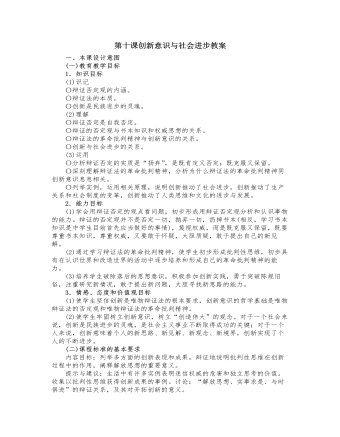
人教版高中政治必修4第十课创新意识与社会进步教案
2.辩证的否定(1)辩证的否定是事物的自我否定。事物内部存在着肯定方面和否定方面,它们既对立又统一。最初,肯定方面处于支配地位,否定方面处于被支配地位。在这种情况下,事物就被肯定着。但是,在矛盾双方的斗争中,否定方面总会由弱变强。一旦否定方面由被支配地位上升为支配地位,事物就转化到了自己的对立面,实现了对事物的否定。事物最终之所以被否定,根源在于事物的内部,是事物内部的否定因素战胜了肯定因素。因此,事物的否定是自我否定。(2)辩证的否定是事物发展的环节和联系的环节。所谓发展,是指新事物的产生和旧事物的灭亡。而实现这一过程必须要对旧事物进行否定,否定实现了事物由旧质向新质的飞跃。新事物在否定旧事物时,并不是把旧事物全盘抛弃,一笔勾销。旧事物是新事物的母体,新事物从旧事物那里脱胎而来,新事物是在批判地继承旧事物中的一切积极的有生命力的因素的基础上发展起来的。这样,在新旧事物之间就存在着必然的联系。
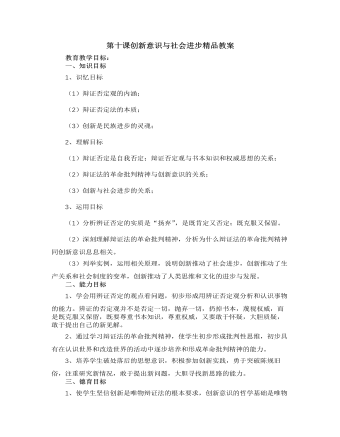
人教版高中政治必修4第十课创新意识与社会进步精品教案
在数学上,0这个数是解决记数和进位问题而引进的概念,由于它不能表示实在的东西,很长时间人们不把它看作是一个数。认为0是无,是对有的否定。从唯物辩证法的观点看,这种否定不是形而上学的简单否定,而是具有丰富内容的辨证否定。辨证的否定是发展的环节。0是从无到有的必经之路,是连接无和有的桥梁。0又是正数和负数之间的界限,它既否定了任何正数,也否定了任何负数,是唯一的中性数。但它又是联结正数和负数的中间环节。没有0,负数就过渡不到正数去,正数也休想发展到负数来。数学中的0是对任何定量的否定。如果没有这一否定,任何量的发展都无从谈起。这个否定不是一笔勾销,而是扬弃。因为它克服了任何定量的有限性,成为其发展的环节。在现实生活中,0作为辨证的否定,也体现出联系和发展的性质。如0度不是没有温度,而是非常确定的温度。

新人教版高中英语必修3Unit 5 The Value of Money-Discovering Useful Structures导学案
4.They were going to find someone to take part in their bet when they saw Henry walking on the street outside.[归纳]1.过去将来时的基本构成和用法过去将来时由“would+动词原形”构成,主要表示从过去某一时间来看将要发生的动作(尤其用于宾语从句中),还可以表示过去的动作习惯或倾向。Jeff knew he would be tired the next day.He promised that he would not open the letter until 2 o'clock.She said that she wouldn't do that again.2.表示过去将来时的其他表达法(1)was/were going to+动词原形:该结构有两个主要用法,一是表示过去的打算,二是表示在过去看来有迹象表明将要发生某事。I thought it was going to rain.(2)was/were to+动词原形:主要表示过去按计划或安排要做的事情。She said she was to get married next month.(3)was/were about to+动词原形:表示在过去看来即将要发生的动作,由于本身已含有“即将”的意味,所以不再与表示具体的将来时间状语连用。I was about to go to bed when the phone rang.(4)was/were+现在分词:表示在过去看来即将发生的动作,通常可用于该结构中的动词是come,go,leave,arrive,begin,start,stop,close,open,die,join,borrow,buy等瞬间动词。Jack said he was leaving tomorrow.
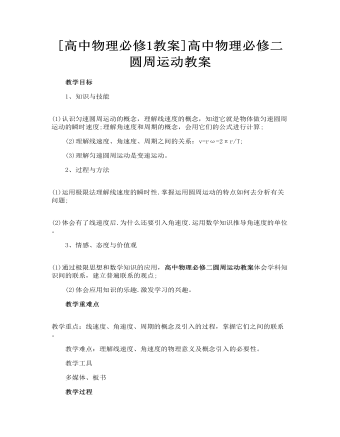
高中物理必修二圆周运动教案
1、知识与技能 (1)认识匀速圆周运动的概念,理解线速度的概念,知道它就是物体做匀速圆周运动的瞬时速度;理解角速度和周期的概念,会用它们的公式进行计算; (2)理解线速度、角速度、周期之间的关系:v=rω=2πr/T; (3)理解匀速圆周运动是变速运动。 2、过程与方法 (1)运用极限法理解线速度的瞬时性.掌握运用圆周运动的特点如何去分析有关问题; (2)体会有了线速度后.为什么还要引入角速度.运用数学知识推导角速度的单位。
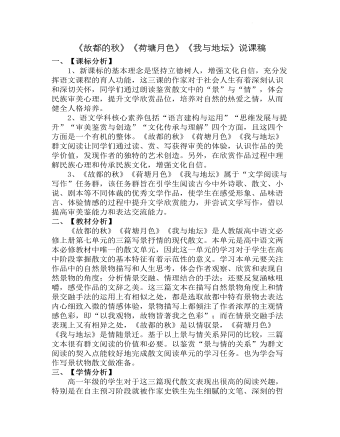
《故都的秋》《荷塘月色》《我与地坛》群文阅读说课稿 2022-2023学年统编版高中语文必修上册
(2) 中国文人的悲秋情结。3.《荷塘月色》中,作者为什么要离开家来到荷塘散步?4. 思考:作者的心里为何“颇不宁静?”(教师补充:写作背景)5. 出门散步后,作者的心情发生变化了吗? 有怎样的变化?6.思考讨论:为什么作者说“我”与“地坛”间有着宿命般的缘分,二者有何相似之处?(阅读1-5段)7.思考:作者从他同病相怜的“朋友“身上理解了怎样的”意图“?三、课堂总结李白说:“天地者,万物之逆旅也。”人生,如同一场旅行,在人生的旅途中,时而高山,时而峡谷,时而坦途,时而歧路。我们或放歌,或悲哭,然而,大自然始终以其不变的姿势深情地看着我们,而我们,也应该学会在与自然的深情对望中,找到生命的契合。正如敬亭山之于李白,故都的秋之于郁达夫,荷塘月色之于朱自清,地坛之于史铁生,他们从中或得到心灵的慰藉、精神的寄托,或得到生存的智慧与勇气,最终完成精神的超脱。
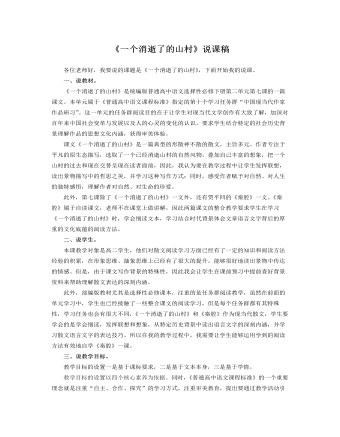
《一个消逝了的山村》说课稿 2021—2022学年统编版高中语文选择性必修下册
这几段内容传达出的是“要敬畏生命,尊重生命;更要敬畏大自然,尊重大自然,爱护大自然”的主旨内涵,因此让学生通过自由朗读的方式,再次体会冯至对这个消逝了的山村的细致的美好的描绘,感悟冯至传达出的对生命,对自然的理解和思考。5.最后一个自然段的解读依然是交给学生,先齐读课文,再让学生自主分享自己的体会或疑惑。但在这一环节我也设计了两个我认为必须解答的两个问题,一是怎么理解“在风雨如晦的时刻”;二是“意味不尽的关联”是指什么。我认为这两个问题一个涉及到写作背景,一个涉及到对全文主旨的一个整体把握,能够进一步帮助学生理解散文的深刻内涵和主旨,让学生有意识的在阅读散文过程中通过背景知识进行理解。既尊重学生的个性化解读,又能够让学生有意义学习,完成预设的教学目标。如果学生没有提到这两处,那我就需要做出补充。
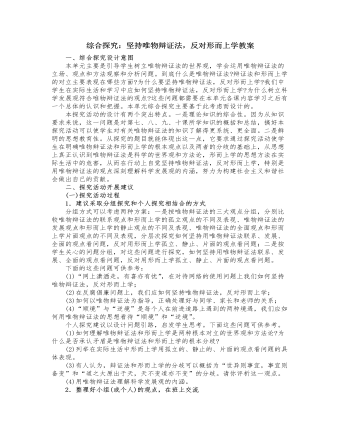
人教版高中政治必修4综合探究:坚持唯物辩证法,反对形而上学教案
5.循环经济当前,发展循环经济和知识经济已成为国际社会的两大趋势,有的发达国家甚至以立法的方式加以推进。循环经济本质上是一种生态经济,它要求运用生态学规律而不是机械的规律来指导人类社会的经济活动,减量化、再利用和资源化是其三大原则。传统经济是一种“资源——产品——污染排放”单向流动的线性经济,特征是高开采、低利用、高排放;与之不同,循环经济倡导的是一种与环境和谐的经济发展模式,它要求把经济活动组织成一个“资源——产品——再生资源”的反馈式流程,特征是低开采、高利用、低排放。目前,我国已经把发展循环经济作为编制“十一五”规划的重要指导原则。6.当心被优势“绊倒”有三个旅行者同时住进一家旅店,早上同时出门旅游。晚上归来时,拿伞的人淋得浑身是水,拿拐杖的人跌得满身是伤,而什么也没有带的人却安然无恙。
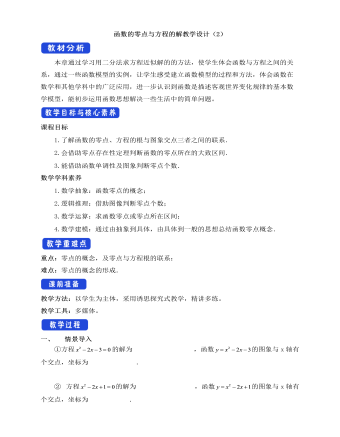
人教A版高中数学必修一函数的零点与方程的解教学设计(2)
本章通过学习用二分法求方程近似解的的方法,使学生体会函数与方程之间的关系,通过一些函数模型的实例,让学生感受建立函数模型的过程和方法,体会函数在数学和其他学科中的广泛应用,进一步认识到函数是描述客观世界变化规律的基本数学模型,能初步运用函数思想解决一些生活中的简单问题。1.了解函数的零点、方程的根与图象交点三者之间的联系.2.会借助零点存在性定理判断函数的零点所在的大致区间.3.能借助函数单调性及图象判断零点个数.数学学科素养1.数学抽象:函数零点的概念;2.逻辑推理:借助图像判断零点个数;3.数学运算:求函数零点或零点所在区间;4.数学建模:通过由抽象到具体,由具体到一般的思想总结函数零点概念.重点:零点的概念,及零点与方程根的联系;难点:零点的概念的形成.

人教版新课标高中物理必修1用牛顿运动定律解决问题(二)教案2篇
观察实验视频实验验证师:其实大家完全可以利用身边的器材来验证。实验1、用弹簧秤挂上钩码,然后迅速上提和迅速下放。现象:在钩码被迅速上提的一瞬间,弹簧秤读数突然变大;在钩码被迅速下放的一瞬间,弹簧秤读数突然变小。师:迅速上提时弹簧秤示数变大是超重还是失重?迅速下放时弹簧秤示数变小是超重还是失重?生:迅速上提超重,迅速下放失重。体会为何用弹簧秤测物体重力时要保证在竖直方向且保持静止或匀速实验2、学生站在医用体重计上,观察下蹲和站起时秤的示数如何变化?在实验前先让同学们理论思考示数会如何变化再去验证,最后再思考。(1)在上升过程中可分为两个阶段:加速上升、减速上升;下蹲过程中也可分为两个阶段:加速下降、减速下降。(2)当学生加速上升和减速下降时会出现超重现象;当学生加速下降和减速上升时会出现失重现象;(3)出现超重现象时加速度方向向上,出现失重现象时加速度方向向下。完全失重
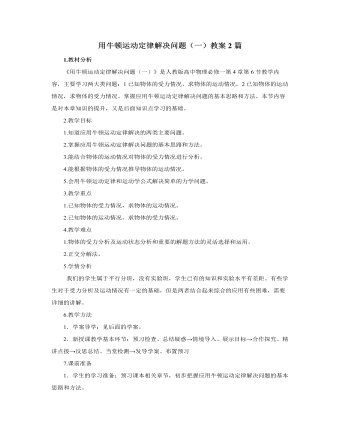
人教版新课标高中物理必修1用牛顿运动定律解决问题(一)教案2篇
(四)实例探究☆力和运动的关系1、一个物体放在光滑水平面上,初速为零,先对物体施加一向东的恒力F,历时1秒,随即把此力改变为向西,大小不变,历时1秒钟,接着又把此力改为向东,大小不变,历时1秒钟,如此反复只改变力的方向,共历时1分钟,在此1分钟内A.物体时而向东运动,时而向西运动,在1分钟末静止于初始位置之东B.物体时而向东运动,时而向西运动,在1分钟末静止于初始位置C.物体时而向东运动,时而向西运动,在1分钟末继续向东运动D.物体一直向东运动,从不向西运动,在1分钟末静止于初始位置之东☆牛顿运动定律的应用2、用30N的水平外力F,拉一静止放在光滑的水平面上质量为20kg的物体,力F作用3秒后消失,则第5秒末物体的速度和加速度分别是A.v=7.5m/s,a=l.5m/s2B.v=4.5m/s,a=l.5m/s2C.v=4.5m/s,a=0D.v=7.5m/s,a=0